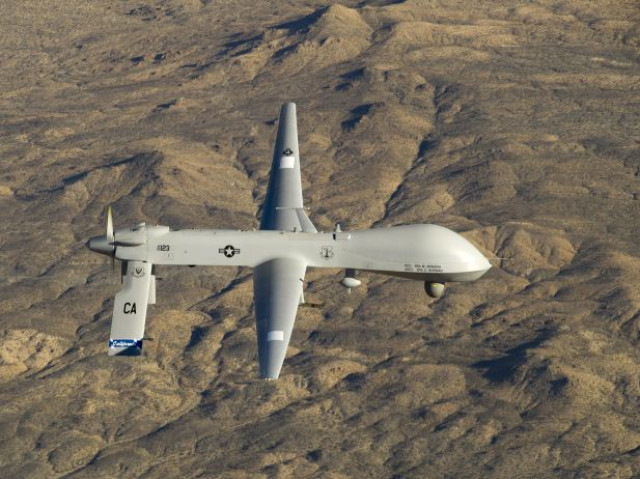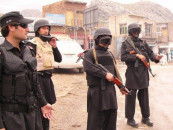Pakistan sees highest drone barrage in a month since October 2011
Nine drone strikes recorded in October, the most strikes in a month since October 2011

Nine drone strikes were recorded in October, the most strikes in a month since October 2011, according to the Bureau of Investigative Journalism.
The United States halted drone strikes in Pakistan for the first six months of 2014 while the government engaged in ultimately fruitless peace talks with the Taliban insurgency.
But the strikes restarted on June 11, just four days before the military launched a full-scale offensive against militants in North Waziristan agency.
Four strikes in October hit Shawal where many of the militants who fled the offensive are believed to be hiding in the thickly forested, mountainous area.
In early hours of October 7, drones had fired two missiles at a compound at Kund Ghar area of Shawal and killed at least six while injuring nine persons. In the same area, US drone had targeted another compound of suspected militants at afternoon and eliminated at least eight more lives on the spot.
Five suspected militants were killed in a strike in Shawal on October 6, and another five killed in a strike in the same area on October 5.
Death tolls from drone strikes are often disputed since the area is off limits to independent journalists and observers. The Taliban also frequently seal off the sites of attacks.
Drones have also hit targets in Datta Khel, North Waziristan, striking three times in four days. Datta Khel has been the target of eight US drone strikes this year and numerous Pakistani air strikes.
Two US predator strikes on October 11 killed at least eight suspected militants — including a senior member of al Qaeda’s South Asia franchise and a key Taliban commander in the Khyber and North Waziristan tribal regions.
There have now been more than 400 drone strikes since June 2004 in the country leading to a total of 2,383 to 3,858 reported killed.
Despite the intensity of the attacks, on average 3.2 people died per strike -- a relatively low monthly casualty rate in the campaign ongoing since June 2004.
Militants killed
Seven of the 29 to 49 people killed in drone strikes in Pakistan in October have been named in media reports as alleged militants.
A purported spokesperson for the newly established al Qaeda franchise for the Indian Subcontinent, said that a senior member of his group, Sheikh Imran Ali Siddiqi, aka Haji Shaikh Waliullah, was killed in a strike in Khyber on October 11.
In the second attack in North Waziristan on the same day, a political administration official claimed that four militants, including a key TTP commander, Muhammad Mustafa, were killed in the attack.
Five victims were named in an October 30 strike in South Waziristan, including an important commander of the feared Haqqani network.
“At least seven militants were killed in the drone strike,” an intelligence official based in Wana told AFP, adding that the dead included four foreigners and a top Haqqani commander.
“Abdullah Haqqani (the commander) was responsible for sending suicide bombers to Afghanistan,” the official said.
Also killed were four people identified as Arabs by unnamed sources in media reports. The names given were: Adil, a Yemeni; Abu Dawooduddin, from Sudan; and Umar and Amadi, from Saudi Arabia.



















COMMENTS
Comments are moderated and generally will be posted if they are on-topic and not abusive.
For more information, please see our Comments FAQ